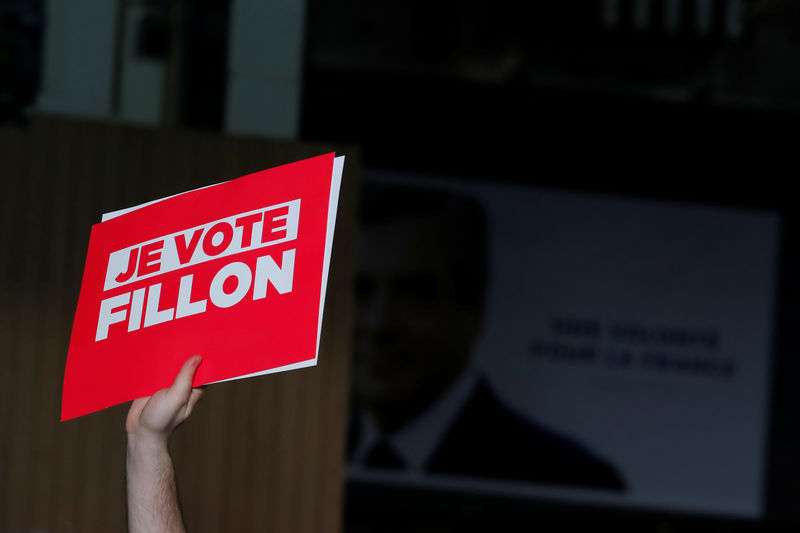By Sarah White and Jean-Francois Rosnoblet
PARIS/MARSEILLE (Reuters) - Two of the outside contenders in France's presidential election, Francois Fillon and Jean-Luc Melenchon, whipped up support with mass rallies on Sunday, seeking a last-gasp boost ahead of an increasingly tight first voting round.
For weeks, polls have shown centrist Emmanuel Macron and far-right leader Marine Le Pen on track to top the first round of voting on April 23 and go through to a May 7 runoff.
But recent polls have shown the race tightening as the front-runners faltered and far-left maverick Melenchon surged after strong performances in two televised candidates' debates.
A Kantar Sofres poll for media organisations Le Figaro, LCI and RTL showed Macron and Le Pen tied on 24 percent in the first round, with Melenchon taking third place for the first time on 18 percent, up six points since mid-March.
That put him a point ahead of conservative candidate Fillon, whose campaign has struggled as he seeks to defend himself from nepotism allegations.
Speaking at a big rally in the southern port city of Marseille, veteran Communist-backed candidate Melenchon sounded full of confidence.
"We can hear it. We can feel it. Victory is within our reach," said Melenchon, who aims to take France out of NATO and also hold a referendum on EU membership.
Organisers said 70,000 people gathered in Marseille's Old Port district to hear Melenchon.
Fillon too is still hoping for an upset.
"There is still everything to play for. The days ahead of us will be decisive," Fillon told cheering supporters waving the blue, white and red national flag at a show of strength in Paris, which according to organisers drew over 20,000 people.
There were no independent estimates of the crowd sizes.
Fillon, 63, was an early frontrunner to win the election but his bid faltered following allegations that he had paid his wife and two of his five children hundreds of thousands of euros of public money for minimal work. He denies any wrongdoing.
"I'm not asking you to like me. I'm asking you to back me, because this is about what's best for France," Fillon said.
With one in three French voters still undecided, there is a chance of a first-round surprise.
Even some of Fillon's supporters admit the campaign has been nerve-racking, though many at the Paris meeting said they didn't trust the polls.
"There were moments when we were really worried," said Raymond Spreder, 72, a retired builder from the Vosges region who has travelled to several rallies with his wife.
"But he's done well considering everything that's been thrown at him. He's the most solid candidate, it's his policies that we like," he said.
Melenchon, a former Trotskyist, was a wildcard until his spirited performances in two televised debates strengthened his campaign and helped him leech support from the Socialist candidate, Benoit Hamon.
In the 2012 presidential election, Melenchon's insurgent campaign and firebrand style also drew crowds and favourable opinion in polls, but he fell short in the end with 11 percent of the vote.
Macron, a pro-European former economy minister, aims to transcend the traditional left-right divide in French politics and reduce public spending and taxes.
If he reaches the second round, all polls predict he would easily beat Le Pen, whose plans to ditch the euro and hold a referendum on EU membership have spooked many investors.

For a graphic on French presidential election http://tmsnrt.rs/2jLwO20